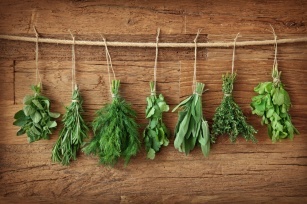Contents

Much has been said about the health benefits of herbs – just as much has been documented and proven. Therefore, it cannot be denied that herbs encourage you to reach for them both because of their healing properties and the captivating aromas that usually accompany them. In the summer, herbs that are widely available and fresh are especially popular – m. dill, parsley, basil. We should reach for them in any quantities, because their green leaves hide the health itself!
Herbs and their properties
Herbs are used by everyone who, while preparing various specialties in the kitchen, appreciates their aromatic and taste qualities. The leafy parts of plants are used as additives, spices and medicinal agents. They are grouped into several families: celery (e.g. parsley, dill, coriander), mint and onion. Popular medicinal herbs have taste qualities that result from the high concentration of oils. The compounds they contain have a positive effect on the functioning of the body – it is said that they have a similar effect as vegetables and fruits. An additional advantage of herbs is that they contain minerals – mainly potassium, iron, magnesium, as well as vitamins – A, C, folates, antioxidants and chlorophyll that dyes them green.
Properties of herbs in the field of work of the digestive system, they mainly relate to supporting digestion, stimulating the secretion of bile acids, preventing flatulence. In addition, they inhibit the growth of bacteria that cause poisoning.
Antioxidants in herbs prevent inflammation, neutralize allergy symptoms, prevent the development of cancer. In addition, they inhibit the oxidation of fats, which means that food does not go rancid, and atherosclerotic plaque is not formed. They also prevent the formation of blood clots and support blood circulation.
Herbs added to meats and marinades preserve these products. It is best to eat them fresh or add the leaves at the end of the preparation of the dish, because with longer heating time they lose their original values and become bitter. Therefore, it is recommended to use herbs fresh, in torn or chopped form to decorate previously prepared meals.
Basil – properties and application
Fresh basil encourages you to reach for it mainly because of its interesting balsamic-lemon aroma and refreshing taste. Basil properties increase the antioxidant capacity of the body. It is also said that common basil is helpful in the treatment of arthritis and intestinal inflammation. This herb is very willingly used in the kitchen, composing it with dishes made of tomatoes, salads, white sauces, and pesto.
Garden dill – healing properties
Dill also attracts with its characteristic spicy smell and taste. It contains vitamins and numerous mineral compounds that inhibit inflammatory processes, improve blood circulation, and facilitate the removal of water from the body. Reaching out in the kitchen dilladding it to potatoes, cold soups, eggs, sauces, pickled vegetables.
Parsley – nutritional properties
Properties of parsley most often refer to the content of the antioxidant apigenin in their composition. This very popular herb with a celery flavor contains compounds that support the immune system, soothe joint pain and inhibit the development of urinary tract infections. Parsley it also has diuretic properties, improving liver function and detoxification. In addition, it is used to neutralize the unpleasant smell from the mouth after eating other foods. Natka It is also widely used in the kitchen, adding it to various types of meat, fish, vegetables, and sauces.









